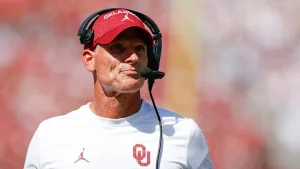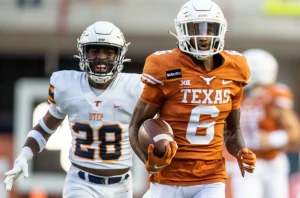
Alabama basketball possesses an ‘aura’: What it is, the reason for its emergence, and Michael Jordan’s connection
Alabama Basketball’s Aura: The Rise of a Powerhouse and Michael Jordan’s Connection
In the realm of college basketball, certain programs have established legacies marked by consistent success, legendary players, and unforgettable moments. Over the past few years, Alabama basketball has emerged as one of the most exciting and intriguing teams in the sport. The program’s aura—an intangible quality of confidence, charisma, and skill—has elevated it to a level that resonates far beyond the court, garnering attention from fans, analysts, and opponents alike. But what exactly is this “aura,” what has caused its rise, and how is Michael Jordan connected to it? This essay seeks to explore the evolution of Alabama basketball, the rise of its aura, and the surprising connection to the legendary Michael Jordan.
Defining the ‘Aura’ of Alabama Basketball
In sports, an “aura” refers to a unique and almost mystical presence that a team or individual projects onto the public. It’s not just about raw talent or on-court performance; it’s about how a team carries itself, how it inspires awe, and how it generates excitement in the fan base. For Alabama basketball, this aura has emerged as a combination of athletic prowess, dynamic coaching, and a shift in the culture surrounding the program.
Alabama basketball’s aura is multi-dimensional. On the court, it’s about high-flying athletes, a relentless pace of play, and a defensive intensity that overwhelms opponents. Off the court, it’s a sense of swagger, a belief that the program is on the rise, and a growing reputation as a team that is poised to challenge traditional powers in college basketball. It’s an aura that suggests Alabama is no longer an underdog but a force to be reckoned with in the SEC and on the national stage.
The Emergence of Alabama Basketball’s Aura
While Alabama basketball’s aura is undeniable today, its emergence as a legitimate contender in college basketball is a more recent development. Historically, Alabama was more recognized for its football program, and basketball often played second fiddle. However, over the past decade, things have changed. The program’s rise has been marked by both an influx of talent and a change in coaching philosophy.
One of the main catalysts for the emergence of Alabama basketball’s aura was the hiring of head coach Nate Oats in 2019. Oats brought with him an exciting brand of basketball focused on high-tempo, three-point shooting, and tough defense. This modern, fast-paced style of play resonated with both the team’s players and its fans. Oats’s emphasis on analytics-driven decision-making and adapting to the changing landscape of college basketball allowed Alabama to not only win games but do so in a way that captured attention across the country.
Under Oats, Alabama has reached new heights, with the team winning the SEC regular season title and making deep NCAA tournament runs. The team has been consistently ranked among the top teams in the nation, and its up-tempo style has made it a favorite of both analysts and casual fans alike. This success has generated an air of confidence and excitement around the program, contributing heavily to its growing aura.
Recruiting Success: The Players Who Define the Aura
The rise of Alabama basketball has been fueled by an influx of top-tier recruits who embody the program’s newfound identity. Oats’s success in recruiting, coupled with his ability to develop talent, has been pivotal in turning Alabama into a basketball powerhouse. The team’s roster has featured a combination of high-flyers, sharpshooters, and lockdown defenders—all of whom contribute to the program’s aura of dominance.
One of the most notable players to come through the program during this era is Jaden Ivey, a future NBA star who showcased his immense potential at Alabama. His explosiveness, coupled with his ability to take over games, has made him one of the most feared players in college basketball. His performances on the court have helped establish Alabama as a legitimate contender and added to the team’s growing aura.
Alabama’s success has also been marked by a string of standout players in recent years, including Herb Jones, who was named SEC Defensive Player of the Year, and Jaden Ivey’s teammate, Jahvon Quinerly. These players, among others, helped solidify Alabama’s position as one of the top programs in college basketball.
As these players continue to perform at a high level, they fuel the program’s identity. The program’s aura is not just built on past accomplishments but on the belief that it can continue to produce talent and achieve success at the highest level.
The Connection to Michael Jordan
Now, how does Michael Jordan—perhaps the greatest basketball player of all time—fit into the picture of Alabama basketball’s aura? The connection between Jordan and Alabama is not one of direct involvement with the program, but rather one of inspiration and influence. Jordan’s legacy as a transcendent player has been felt across all levels of basketball, and his impact has been profound on Alabama’s current generation of players and coaches.
The influence of Jordan on Alabama basketball can be seen in several ways. First and foremost, the way the program is built and plays basketball shares some parallels with the iconic Chicago Bulls teams of the 1990s that Jordan led to six NBA championships. Like the Bulls, Alabama’s modern style is focused on up-tempo play, spacing the floor with shooters, and a commitment to defense. While Jordan’s style was defined by his scoring and clutch performances, the foundation of his game was built on creating opportunities through defense, leadership, and unselfishness. These qualities have resonated with Alabama’s coaching staff and players, many of whom idolize Jordan’s work ethic and competitive spirit.
Another connection comes in the form of Alabama’s rise to prominence during a time when the sport was transitioning to a more modern, analytical approach. Jordan’s success helped lay the groundwork for a new era of basketball, one that valued efficiency, pace, and player versatility. As the game evolved, so too did the style of play at Alabama, which mirrored the kind of high-flying, fast-paced game that Jordan’s Bulls were known for. Players like Jaden Ivey and Herb Jones, who combine both offense and defense in dynamic ways, are following in the footsteps of players like Jordan, who made a name for himself with his all-around game and ability to dominate on both ends of the floor.
Jordan’s personal mentality—his relentless work ethic, his desire to improve, and his killer instinct—has influenced not just Alabama’s current roster but countless players in college basketball today. Alabama’s players, much like Jordan, seem to have adopted the mindset that they can take on any challenge and overcome any obstacle, whether it’s a tough SEC opponent or a tough postseason matchup. This mentality is part of the larger aura surrounding Alabama basketball—a belief that the team is destined for greatness and capable of competing with the best.
The Future of Alabama Basketball’s Aura
As Alabama basketball continues to build on its recent success, it is clear that the program’s aura is not just a flash-in-the-pan phenomenon but something that will continue to grow and evolve. With the continued leadership of Nate Oats, a talented roster, and a fanbase eager to support the program, Alabama is positioned to remain one of the top teams in the SEC and in college basketball overall.
Furthermore, as the program attracts more top-tier recruits and continues to develop its talent, the aura surrounding Alabama will likely only strengthen. The energy and excitement that now surround Alabama basketball will help solidify the program’s place among college basketball’s elite, much in the same way that Michael Jordan’s aura helped define his legacy in the NBA. The connection between Alabama basketball’s rise and Jordan’s influence is not one of direct interaction but one of shared principles, shared philosophies, and shared greatness.





